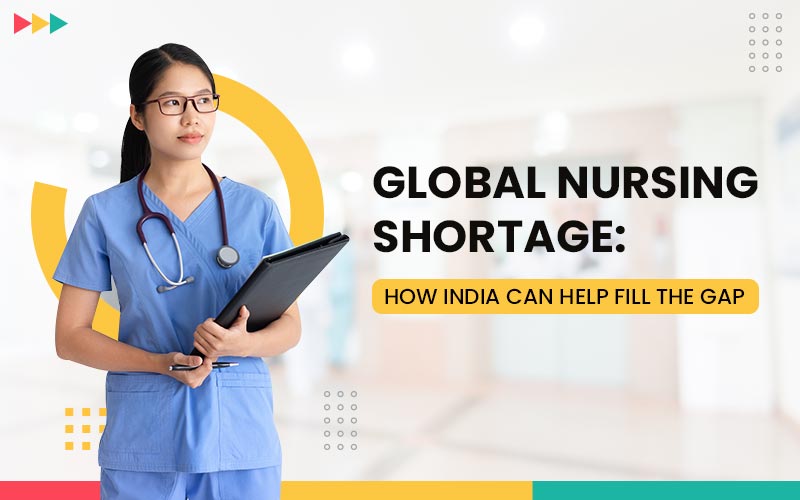
Global Nursing Shortage: How India Can Help Fill the Gap
The world is facing a critical healthcare workforce crisis that threatens the quality and accessibility of medical care everywhere. According to the World Health Organization (WHO), there are currently around 29 million nurses and 2.2 million midwives globally. Yet by 2030, the world could face a shortage of 4.8 million nurses and midwives - a gap that poses serious challenges to global public health systems.
Understanding
the Global Nursing Shortage
The global nursing
shortage is not merely a numbers issue. It is a complex, systemic problem
shaped by social, economic, and policy-related factors.
Key Causes
1. Aging Population and
Workforce:
As populations age, the demand for healthcare services continues to rise, while
many experienced nurses approach retirement age, creating a double strain on
healthcare systems.
2. Burnout and Poor Working
Conditions:
Long hours, emotional stress, and insufficient support have led to widespread
burnout and job dissatisfaction, prompting many nurses to leave the profession
prematurely.
3. Limited Training and
Educational Capacity:
Many countries lack sufficient nursing schools, faculty, and infrastructure to
train enough professionals to meet current and future needs.
4. Migration and Workforce
Imbalance:
Skilled nurses often migrate from developing nations to developed ones in
search of better pay, working conditions, and career growth, leaving their home
countries understaffed.
5. Policy and Planning Gaps:
Inadequate workforce planning and underinvestment in healthcare systems have
worsened the shortfall, particularly in low- and middle-income nations.
The
Global Impact of the Shortage
The consequences
of this shortage ripple across all levels of healthcare delivery:
·
Increased Patient Load: Fewer nurses mean heavier workloads,
longer shifts, and reduced patient attention.
·
Decline in Quality of Care: Overworked staff often
face fatigue and stress, leading to errors and reduced patient safety.
·
Longer Wait Times: Hospitals and clinics struggle to
manage demand, causing delays in diagnosis and treatment.
·
Health Inequity: Rural and underserved regions face
the greatest impact, widening the gap in access to healthcare services.
·
Economic Strain: Governments and hospitals spend more
on recruitment, training, and temporary staffing solutions, increasing
operational costs.
The result is a
global healthcare imbalance where the need for care is growing faster than the
capacity to deliver it.
India’s
Potential: A Hub for Global Healthcare Talent
Amid this global
crisis, India stands uniquely positioned to help bridge the gap. With one of
the world’s largest networks of nursing institutions and a reputation for
producing skilled, English-speaking professionals, Indian nurses have become
indispensable to international healthcare systems.
Why India is Emerging as a Key Contributor
·
High-Quality Training:
Indian nursing schools and universities produce graduates well-versed in global
healthcare standards, patient safety, and clinical expertise.
·
Ethical and Adaptable Workforce:
Indian nurses are widely respected for their professionalism, compassion, and
ability to adapt to diverse cultural and medical environments.
·
Expanding Talent Pool:
With thousands of new nurses joining the workforce annually, India has both the
numbers and quality to meet domestic and international healthcare demands.
The
Untapped Strength of Northeast India
Northeast India,
with its growing network of nursing colleges and young, educated population,
holds tremendous potential to become a major contributor to India’s healthcare
workforce both nationally and globally.
·
Educational Growth:
States like Assam, Meghalaya, Manipur, Nagaland, and Arunachal Pradesh have
seen a steady rise in nursing and paramedical institutions producing skilled
graduates ready for advanced training and global placements.
·
English Proficiency and Cultural Adaptability:
The region’s strong command over English and exposure to multicultural
environments make its professionals well-suited for international healthcare
settings.
·
Youth Advantage:
With a predominantly young population and rising interest in healthcare
careers, the Northeast can serve as a vibrant talent reservoir for India’s
expanding global healthcare role.
·
Government and Institutional Support:
Targeted investment in healthcare education, skill development, and global
partnerships can further position the Northeast as a strategic hub for nursing
excellence and international deployment.
By recognizing and
nurturing this regional potential, India can not only empower local youth but
also strengthen its global healthcare impact.
Bridging
the Gap: WorldPro’s Role in Global
Healthcare Mobility
WorldPro is empowering India’s skilled healthcare professionals and
connecting them with world-class opportunities across the globe.
Their global
staffing and mobility platform partners with leading hospitals, universities,
and healthcare institutions across Australia, Canada, the Middle East, Japan,
and beyond to deliver:
·
Transparent, ethical recruitment with no hidden costs or exploitation.
·
Comprehensive training and certification support to prepare candidates
for international licensing exams and healthcare standards.
·
End-to-end migration and deployment assistance, ensuring a smooth and
secure transition to global workplaces.
With 20+ years of
experience and over 15,000 nurses successfully placed worldwide, WorldPro
continues to strengthen healthcare systems while transforming individual lives.
A
Global Effort for a Healthier Future
The nursing
shortage is a shared global challenge, one that demands cooperation, policy
reform, and sustainable workforce solutions.
India’s healthcare
talent, supported by organizations like WorldPro, can play a defining role in
filling this gap and ensuring that quality care reaches every patient,
everywhere.
Disclaimer: The opinions expressed in this article are those of the author's. They do not purport to reflect the opinions or views of The Critical Script or its editor.

Newsletter!!!
Subscribe to our weekly Newsletter and stay tuned.

















Related Comments